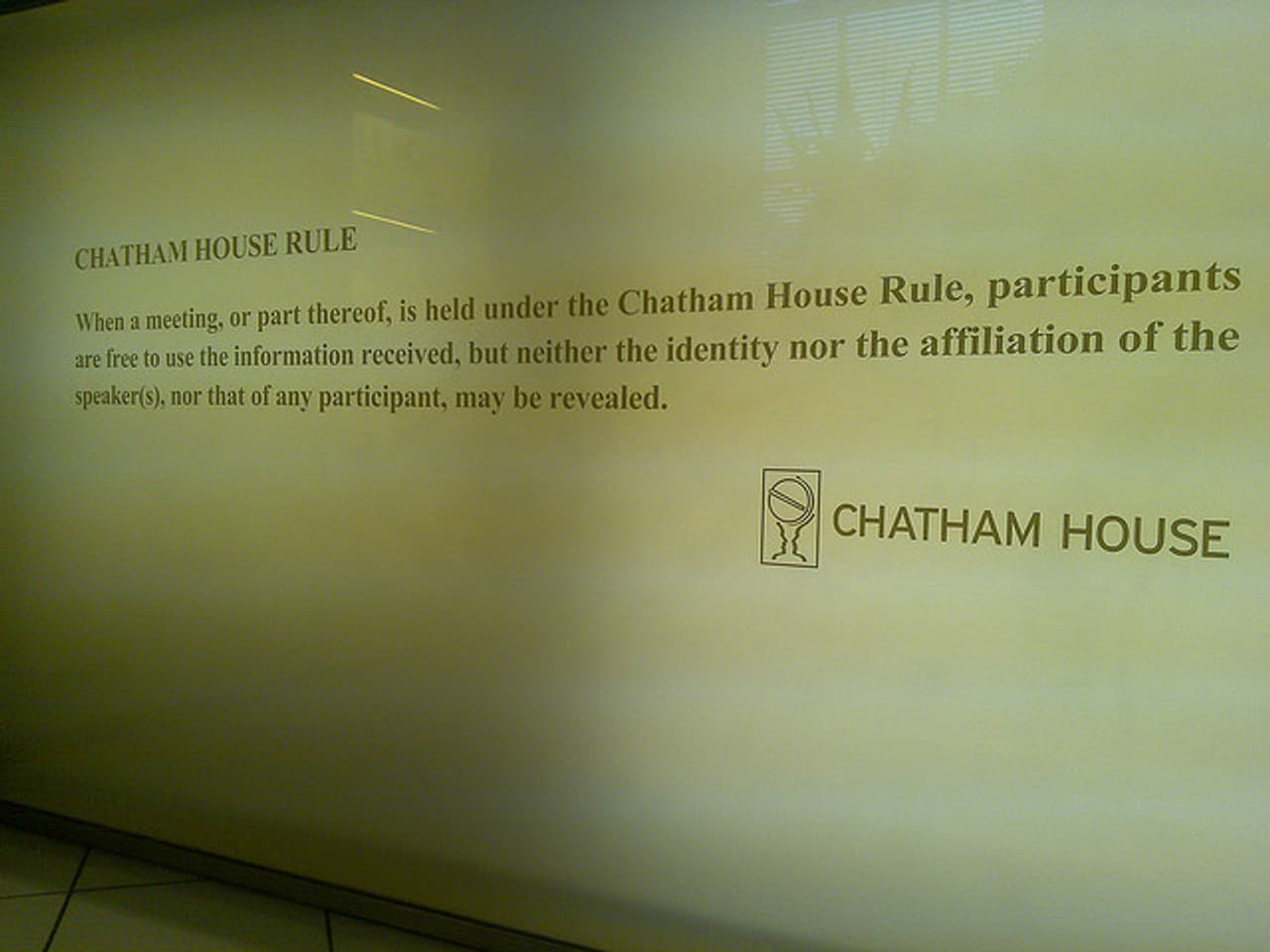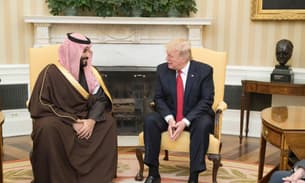
Chatham House’s independent expert is lobbyist
The Chatham House rule at Chatham House reception
The respected independent foreign affairs think-tank Chatham House published a report by a lobbyist on a subject in which his client had a direct interest – without making it clear to readers.
The matter came to light as part of a wider investigation by the Bureau into PR firms working for foreign governments. During undercover meetings several PR firms mentioned using events in conjunction with think-tanks as part of a rehabilitation process for controversial leaders.
Bureau journalists approached Chatham House posing as agents for the government of Uzbekistan. The think-tank turned down their proposals for paid-for seminars on Uzbekistan and made it clear they would not allow funding to influence Chatham House’s independence if the Uzbek government paid for a seminar.
However, the reason behind the undercover operation was that the Bureau had previously found an article about Kyrgyzstan written by an associate fellow which did not mention his involvement with the country.
The Bureau had also found that a Chatham House seminar on democratic reform in Bahrain was funded by a lobbyist working for the Kingdom.
Writing for Chatham House
In an article for Chatham House, John Lough – an associate fellow on the think-tank’s Russia and Eurasia programme and a lobbyist for Kazakhstan – discussed a diplomatic spat between Russia and Kyrgystan.
He noted that Krygyzstan’s interim government had begun an investigation into alleged corruption around fuel supply contracts to a US airbase in the country, an investigation which he said ‘appeared designed to discredit the US government’.
The article did not mention that Mr Lough worked for the lobbying firm BGR, which was acting for Mina Corp, a supplier of fuel to the airbase.
Related article: PR company proposed campaign against Sting
In December 2010 a US Congressional committee criticised the Pentagon for giving Mina Corp contracts worth $3bn to supply jet fuel to the air base in Kyrgyzstan.
Chatham House’s reputation for independence is crucial to us and I think it is legitimate to say that some elements of the article could undermine this.
Keith Burnet, Chatham House
While the committee found no evidence of corrupt links between Mina Corp and Kyrgzstan’s first families, it noted that public suspicions of corruption in the fuel contracts were ‘by no means unreasonable’.
After the Bureau contacted Chatham House, Keith Burnet, communications director, said he had removed Mr Lough’s article from its website. ‘Chatham House’s reputation for independence is crucial to us and I think it is legitimate to say that some elements of the article could undermine this,’ he said.
Mr Lough added: ‘When I write or speak in my Chatham House capacity, I do so from an objective and independent viewpoint. I am open about my professional activities which is why I am listed on the Chatham House website as working for BGR Gabara.
‘Our firm’s role in advising Mina Corp and the Embassy of Kazakhstan in London is fully disclosed and you will find reference to these clients on our website.’
PR firm funding
The investigation also found that a Chatham House seminar on democratic reform in Bahrain was funded by a lobbyist working for the Kingdom.
The seminar, entitled ‘Democratic Institutions and Community Relations in Bahrain,’ was subsequently criticised by the London-based Bahrain Human Rights Monitor for the ‘propagandistic’ language of its speakers.
One speaker at the event criticised the British government for granting asylum to Bahraini dissidents – who he said were ‘good for nothings – and described Bahrain as a ‘shining symbol of internationalism’.
A few months later the Kingdom launched a crackdown on suspected dissidents, ahead of fiercer repression that followed uprisings across North Africa and the Middle East in 2011.
Chatham House has admitted the seminar was funded by Apex Communications, which was working for the Kingdom of Bahrain at that time.
Chatham House’s advance publicity for the event noted that: ‘The kingdom has made steps towards democratic reform since King Hamad came to power in 2002.’
Speakers included Sayed Deya’a al Mousawi, then a member of Bahrain’s Shura council, which is appointed by the King, and Dr Saleh Ali, a vice-chairman of the Bahrain parliament and chairman of the Al-Menbar National Islamic Society.
The third and final speaker was Anwar Abdulrahman, chairman of the Dar Akhbar Al Khaleej publishing house, which publishes the Gulf Daily News.
The seminar was an invitation-only event governed by Chatham House rules, which forbids the reporting of attributed quotes.
British government attacked
But three days after the event a story covering it appeared in the Gulf Daily News. The paper said Mr Abdulrahman had criticised the British government for granting asylum to Bahraini dissidents.
The Bahrain event was organised by Chatham House with costs covered by Apex Communications, who are linked to the government of Bahrain. It was undertaken on a not-for-profit basis.
Keith Burnet, Chatham House
‘Mr Abdulrahman said British taxpayers’ money was being wasted on sheltering “good-for-nothings”,’ the paper reported. The Gulf Daily News also quoted its own publisher criticising Amnesty International for producing ‘baseless and untrue reports’.
Mr Abduhrahman apparently also opined to the seminar that ‘with its fledgling democracy, free economy, free press and liberal society, Bahrain has become a shining symbol of internationalism.’
The Bahrain Human Rights Monitor also criticised the seminar, which it said had concentrated on positive aspects of Bahrain’s reform programme when ‘there are many questions in the minds of foreign observers with regards to the political and human rights situation, which need to be answered.’
‘Chatham House is an elite centre, and as such the participants in the seminar required more than just a general presentation of Bahrain’s record in developing its political, economic, judicial and human rights system,’ it added. ‘They are also not in favour of a one-sided, stereotypical picture, and do not accept propagandistic language.’
The BHRM’s criticism is the all more surprising since it is no vociferous critic of the Bahraini regime: it is funded by the government of Bahrain.
Keith Burnet, communications director for Chatham House said: ‘The Bahrain event was organised by Chatham House with costs covered by Apex Communications, who are linked to the government of Bahrain. It was undertaken on a not-for-profit basis.’
He added: ‘Chatham House’s role is not to ensure that every individual event we run represents both an official and an opposing viewpoint. Over time we run a number and range of events that reflect a variety of political and other views.’
The think-tank has hosted a number of meetings with Bahraini human rights groups and opposition representatives over the years, he added, pointing out that Chatham House’s most recent event on Bahrain – which was not held under Chatham House rules – featured a recently resigned opposition MP, a Bahraini political scientist and a former British diplomat to Bahrain.
Chatham House’s links to Bell Pottinger
Chatham House jointly produced a report on strategic communications, with Bell Pottinger, the PR firm which boasted of its links to government to undercover reporters from the Bureau.
The report, which ‘aims to raise awareness of the role and potential of strategic communications’, states that it was instigated by Bell Pottinger and Chatham House has confirmed the firm also paid for it.
One of the report’s conclusions is that ‘there is a need for greater recognition of the ability of those outside government to communicate strategically’.
It adds: ‘The private sector in particular can play a role in strategic communications, with notable examples in conflict stabilisation and transformation.’
The report was produced by the Bell Pottinger Public Advocacy.
Mark Turnbull, Bell Pottinger Public Advocacy’s managing director, wrote a blog post on the report, praising it as ‘timely’ – without mentioning who instigated and funded it, and bemoaning the government’s failure to put communications at the heart of the work of the new National Security Council.




